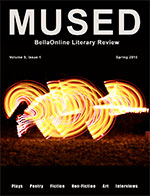Aileen - In Her Own Words
Aileen
My writing has always been entangled with personal history, and for that reason, it represents my journey of self-discovery. There have been three main periods of that journey. The first period lasted from childhood and adolescence into my twenties. During that time, I wrote stories and poems that I didn't understand. I just knew I had to write them. I carried around small spiral notebooks (my "purse diaries") in which I wrote down my thoughts as frequently as I could. I didn't feel that I belonged in the outside world, so I focused on what was inside my head. I also had a horror of forgetting things that happened, so writing them down made me feel a little more confident that my memories were safe.
The second period began in my late twenties, after I had glimpsed some of the underlying truth. I was still in denial about what was going on, but I began to realize that it was something I would be forced to deal with. By then I was in therapy. My writing became more cathartic in nature. The short stories I wrote tended to be melodramatic and melancholy, and my poetry was worse. Because the writing helped me cope with the facts I was learning about myself, most of it was not good, but it was an essential stage. The real-life motifs of mental illness, suicide, trauma, self-harm, and confusion about my identity appeared repeatedly in my stories and poems.
The third period began in my late thirties. By this time I knew the facts about my life and I was actively seeking to manage them. I deliberately wrote about topics related to my own history, even when writing about them meant experiencing extreme emotional pain and feeling "on edge" constantly.
Writing about trauma, whether it occurred in childhood, war, or another setting, is a difficult topic for most people. I felt shame when I wrote about my traumatic experiences because I believed they were my fault. In addition, I sometimes felt hurt, anger, hopelessness, self-loathing, and most commonly, paralyzing fear. At each stage I coped with the painful emotions in a different way, but I did cope with them (helped by therapy and medication).
The best way I found to cope with the feelings was the action I had avoided for so long: share them with other people through my writing. I was terrified at the reactions I might get, but those reactions didn't come, or if they did, they soon changed to something more helpful. At first I simply read them to my therapist, or friends and family members. I found how much sharing helped, so I began looking for other trustworthy people.
When I sat down to write a piece for this issue, I cleared my mind, then wrote the narrative just as it happened, just as I remembered it. This time there was no need for embellishment and no need to transfer it into outer space or history in order to slide it past my mind without upsetting me. I simply wrote, and the feeling that resulted was triumph.

